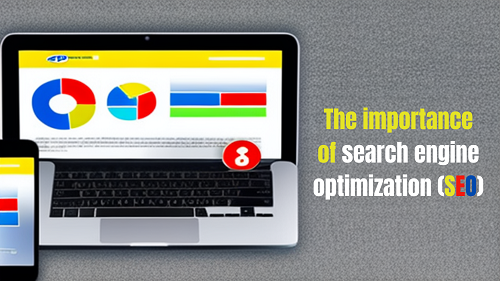Introduction to SEO
SEO is the practice of optimizing a website for Google search with the goal of earning higher web traffic levels and improving the visibility of the site.
When done correctly, SEO can be an extremely effective tool for growing a business or website. However, because there are so many different factors that go into ranking a website on Google, it can be difficult to figure out where to start with SEO.
This is where we come in! In this blog post, we’re going to give you a crash course in SEO and show you how you can use it to improve your website. We’ll cover topics like:
– What is SEO?
– How does SEO work?
– What are some common SEO myths?
– Why is SEO important?
– How can I improve my website’s SEO?
By the end of this post, you should have a solid understanding of what SEO is and how it works. Armed with this knowledge, you can begin making changes to your own website to improve your visibility in Google search results.
How search engines work and rank websites
Search engines like Google and Bing use algorithms to crawl the web and index its content. These algorithms take into account over 200 factors when they are ranking websites in the search engine results pages (SERPs).
The most important factor that determines a website’s position in the SERPs is its relevancy to the user’s search query. This means that if you want your website to rank for a certain keyword, you need to make sure that your website is relevant to that keyword.
There are many other factors that come into play when determining a website’s position in the SERPs. Some of these include:
– The number of high-quality backlinks pointing to your website
– The quality of your website’s content
– The load time of your website
– Whether or not your website is mobile-friendly
– And many more!
If you want your website to rank well in the search engines, it’s important to focus on all of these factors. Search engine optimization (SEO) is the process of optimizing your website for the search engines so that you can rank higher in the SERPs.
The role of keywords in SEO
When it comes to SEO, keywords are everything. They’re how search engines like Google connect searchers with the websites they’re looking for. And they’re what you need to focus on if you want your website to rank higher in search engine results pages (SERPs).
To help you out, we’ve put together a guide to keyword research and SEO. In it, we cover everything from how to choose the right keywords for your website to how to use them throughout your content to improve your SEO.
On-page and off-page optimization techniques
On-page optimization techniques are those that can be implemented on your website to improve your ranking in search engine results pages (SERPs). These include optimizing your title tags and meta descriptions, using keyword-rich headers and subheadings, and creating compelling content that includes targeted keywords.
Off-page optimization techniques are those that involve promoting your website through other channels in order to earn links back to your site. This can be done through guest blogging, social media marketing, and directory submissions, among other things.
The impact of mobile optimization on SEO
It is no secret that mobile devices are increasingly becoming the preferred method of consume web content. Google’s own data shows that over 60% of all searches are now performed on mobile devices. This trend is only going to continue, which makes it more important than ever for businesses to have a mobile-optimized website.
Mobile optimization is not just about making sure your website looks good on a smaller screen. It also includes other aspects such as page speed, site structure, and overall user experience. Google uses all of these factors when determining where to rank your website in its search results.
That means that if you want your website to be visible to potential customers, you need to make sure it is optimized for mobile. Fortunately, there are a number of things you can do to improve your mobile SEO, including:
• Use responsive design: This ensures that your website will look great on any device, regardless of screen size.
• Optimize your images: Large images can slow down your page loading time, so make sure they are properly sized for mobile devices.
• Use short and descriptive titles: Mobile users are typically searching on-the-go and don’t have time to read long titles. Keep them short, sweet, and to the point.
• Include calls-to-action: Make it easy for visitors to take the next step with prominent calls-to-action (e.g., “
The importance of local SEO for small businesses
As a small business owner, you know that every customer counts. That’s why it’s so important to make sure your website is optimized for local search. Local SEO is a specialized form of search engine optimization that helps your website rank higher in search results for customers in your geographic area.
The first step in optimizing your website for local search is to make sure your NAP (name, address, and phone number) is consistent across all of your online listings. You should also include keywords relevant to your location in your website content, titles, and tags. One way to stand out from the competition is to create unique content about your city or region that includes relevant keywords.
Another important factor in local SEO is building citations. Citations are mentions of your business on other websites, such as online directories and review sites. The more high-quality citations you have, the more likely you are to rank higher in local search results. You can get started by claiming and optimizing your listings on popular directories like Yelp, Google My Business, and Bing Places for Business.
Investing time and effort into local SEO can pay off big for small businesses. Customers are searching for businesses like yours online, so it’s important to make sure your website is visible in search engine results pages. By following the tips above, you can start attracting more customers from your local area—and grow your business as a result!
Measuring the success of SEO efforts
There are a number of ways to measure the success of SEO efforts. One way is to track the organic traffic to your website using Google Analytics. Another way is to track the number of leads or sales generated from your website. You can also track the number of backlinks pointing to your website, as well as your website’s search engine ranking for certain keywords.
Conclusion
As search engines continue to evolve and improve, it is essential for businesses to stay informed about the latest trends in SEO. By investing in strategic SEO practices, businesses can increase traffic to their websites and gain a competitive edge over their competitors. Not only does this result in increased website visits and conversions but also improved brand visibility online. With SEO becoming increasingly important, now is the time for businesses to start optimizing their sites so they can remain visible and relevant on the web.






